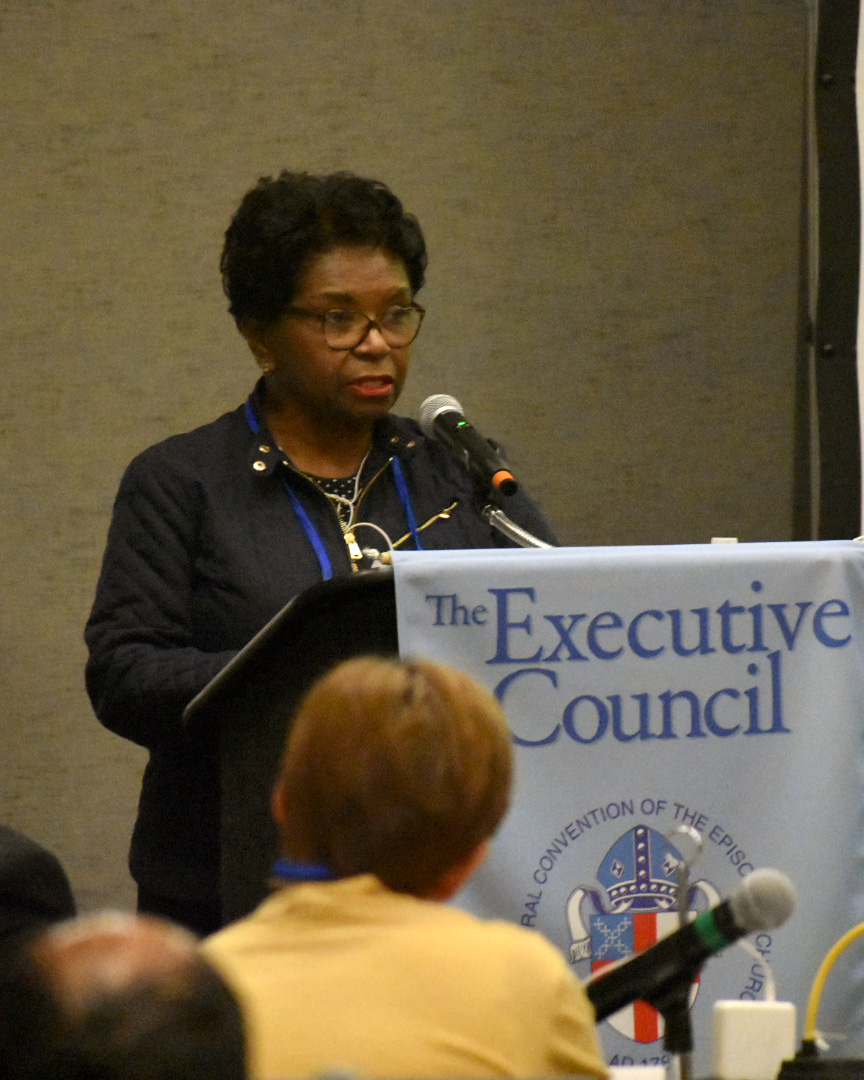This sermon was delivered by New York deputy and member of Executive Council Diane Pollard during the meeting of Executive Council in Birmingham, Alabama on October 18, 2019:
Let the words of my mouth and the meditation of my heart be always acceptable in thy sight, O Lord, my strength and my redeemer.
Over the last three meetings, we as the Executive Council have been contemplating our journey to Becoming a Beloved Community. And, in that process, we have been hearing about the various practices of The Way of Love. We have talked about Turn and about Learn, and at each of these touchpoints, we have reflected on a particular aspect of The Way of Love.
This morning I am going to talk about the Way of Love as we embrace the practice of Go.
In responding to the call for us to “Go,” I call on the words of the prophet Micah in Chapter 6:
He has shown you what is good, and what DOES the Lord require of you ? To act justly, to love mercy and to walk humbly with your God. I would suggest that the Lord requires us to “Go” as we attempt to respond to this charge.
Where do we Go?
Here we are in Montgomery, Alabama, in a city that is as simple and yet as complex as the shaping of the purported American Dream. If the streets and buildings could only speak to us, what would they say? Tomorrow we are going to visit the Legacy Museum from Enslavement to Mass Incarceration and the National Memorial for Peace and Justice. Places that will remind us of many the terrible occurrences of both our history and of our present time. These places will also provide us with the painful opportunity to ask ourselves why and how these events could happen. These visits will also challenge us to recognize the similarities of the existing systems of mass incarceration, poor health care and the lack of educational opportunities for all. These issues haunt our existence as the “land of the free.”
Tomorrow we will Go to these two places that will be painful yet truthful reminders of our American history.
What did we do before we left to prepare ourselves? In preparation for our visit tomorrow, we have been invited to read “Just Mercy,” a book written by Bryan Stevenson that outlines his courage and conviction to guarantee justice for all. In the words of Archbishop Desmond Tutu, this book “should be read by people of conscience in every civilized country in the world to discover what happens when revenge and retribution replace justice and mercy.” We have also participated in two webinars that were offered as educational opportunities. Dean Kelly Brown Douglas reminded us of the present day need for moral leadership and of the moral dialogue in which we “see each person as a cherished part of God’s family.” Dr. Catherine Meeks has reminded us that “pilgrimages are not field trips.” They should be transformative and that we should not return home the way that we came.” In addition to what we have learned in preparation for this pilgrimage, many of us have engaged in other trips, conversations and discussions and other learning opportunities.
What do we bring back with us from our pilgrimage? It is my hope that we will bring back with us the memory of not only what happened, but the present-day effect it continues to have on our people. I hope that we do not decide to lock these learnings in our own personal vaults, but that we will also bring these learnings back and that we will also have the fire to dare to share our learnings and memories with family, friends, strangers, business colleagues, and any others with whom we interact in our daily lives. It is only by talking and sharing our learnings that we can ever hope to affect significant reconciliation. No matter how difficult these actions will be, we should remember that we will remain a family.
Tomorrow is only our beginning in the journey, I pray that we will commit ourselves to some form of continued education and continual commitment and to our practice of Go. As Dr. Meeks reminds us Let us Go and do what God is calling us to do!
I end with a quotation that can inform our trip and one that you will recognize:
“There was a time when the Church was very powerful. It was during that period when the early Christians rejoiced when they were deemed worthy to suffer for what they believed. In those days, the Church was not merely a thermometer that recorded the ideas and principles of popular opinion, but was the thermostat that transformed the mores of society. Whenever the early Christians entered a town the power structures got disturbed and immediately sought to convict them for being disturbers of the peace and outside agitators. But they went on with the conviction that they were a colony of heaven and had to obey God rather than man.
(excerpted from “Letter from Birmingham Jail” by Dr. Martin Luther King)
Amen.
photo: Episcopal News Service


